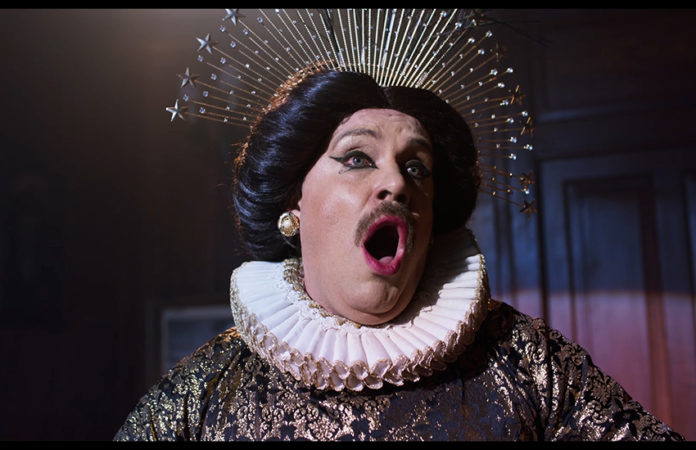After a rising political star in pre-Revolutionary Mexico marries the daughter of the president, he pursues not only higher office but also a clandestine romance with a gay man. His balancing between two worlds involves him in a wider controversy that remains a challenging subject in Mexico.
This is the basis of a new Netflix feature film that takes its name from the controversy in 1901 that inspired it: El baile de los 41 or The Dance of the 41 by Mexican director David Pablos.
The title refers to a drag ball held by a secret club of gay men in a private home in Mexico City that was raided by the authorities, resulting in the arrests of 41 men. According to Mexican lore, there was a 42nd attendee — Ignacio de la Torre, the son-in-law of then President Porfirio Díaz. De la Torre’s wife was Díaz’s daughter, Amada Díaz.
El baile de los 41 premiered on Netflix on May 12. It screened at several festivals beforehand, including its debut last year at the Morelia International Film Festival and a showing earlier this year at the San Francisco International Film Festival.
Director Pablos, who worked on the screenplay with Monika Revilla, was enthusiastic about the film’s Netflix premiere.

“I feel very, very lucky and happy and privileged because I know the kind of platform that [Netflix] is,” Pablos said, calling the streaming premiere “the real breakthrough, the real moment in which the film can go out into the world.”
As Pablos explains, Mexico has struggled to deal with the subject of homosexuality throughout its history. He notes the unpopularity of the number 41 in the army, on street addresses and in schools.
“This story is part of popular culture,” Pablos said, “and for me, it’s very important for presenting the coming out of the gay community, out of the closet here in Mexico. This [was] the first time homosexuality was talked about in the media, in newspapers. That’s why it became so important. Of course, the story back then became much more relevant not only because of homosexuality but also because the son-in-law of the president Porfirio Díaz was involved.”
Pablos credited Revilla — “a very close friend of mine” — with first learning about the Dance of the 41 and contacting him to suggest a film collaboration about it.
“Otherwise, I do not think I would have had the courage to decide to work on a film like this.”
The film stars Alfonso Herrera as Ignacio, Mabel Cadena as Amada, and Fernando Becerril as a mustachioed President Díaz in full military regalia, who personally decreases the number of arrested men from 42 to 41.
Scenes were shot in downtown Mexico City, including the Casa Rivas Mercado mansion, a rare example of period architecture that survived the Mexican Revolution. The mansion serves as Ignacio and Amada’s residence. The narrative also unfolds in the Mexican Congress where Ignacio works and at the gay club, including several explicit scenes.
This is not the first time that Pablos has taken on challenging subjects. His 2015 film Las elegidas (The Chosen Ones) was about prostitution and won him a Golden and two Silver Ariel awards, as well as a screening at Cannes.
El baile de los 41, however, necessitated a look into some puzzling historical questions. Among them is to what extent de la Torre was involved in the controversy.
“We know very little,” Pablos said. “Actually, Ignacio’s name was never mentioned in the media, in the newspapers. They did mention a few names, but Ignacio’s name was never there. There was no way to prove Ignacio was [at] this ball.”
Yet, Pablos said, not only did contemporary gossip identify de la Torre as the 42nd member of the group, but there was a more oblique connection made in a 1906 book about the controversy, Los cuarenta y uno.
“It’s a terrible book, I have to say,” Pablos said, describing its author as “very much in the mindset of that time of what masculinity was supposed to be.” Although de la Torre’s name does not appear in the book, Pablos finds signs of him within its pages: “There is a character [of whom the author] says, ‘This is one of the wealthiest men in Mexico. He is related to the president. He is part of the main inner circle of the president. He is the one [who is] like the leader of this clandestine group of gay men.’”

Pablos also looked at what happened following the scandal between de la Torre and his father-in-law.
“We do know Porfirio Díaz was very much disgusted with Ignacio,” Pablos said. “At first, [de la Torre] was his favorite son-in-law. Afterward, he became, like, unwanted.”
In the film, the ambitious congressman seemingly secures his political future by marrying Díaz’s daughter Amada. He presses his father-in-law for help in obtaining a governorship. Meanwhile, de la Torre develops a secret relationship with a gay man named Evaristo Rivas (Emiliano Zurita) and starts bringing him to the secret club.
“For me, part of the core of the film is this group of 42 men,” Pablos said. “It was important that when you would see them on screen, it would feel real.”
He sought a similar approach toward his protagonist, citing the unsympathetic account of de la Torre in Carlos Tello Díaz’s book El exilio about the Díaz family after the Mexican Revolution.
“Every time he mentioned Ignacio de la Torre, he also said Ignacio and Amada had a terrible relationship, they fought all the time,” Pablos said. “It even got to the point where he was beating her up.”
In writing the screenplay, Pablos said, “We did not want to make Ignacio a hero. We did not want to make him like a martyr. I wanted to make this portraying the real people, human beings, complex human beings, and portray this complex situation where he is at.”
Pablos found a resource in the Rivas Mercado mansion. He used the bright colors in its rooms as a contrast with Amada’s worsening relationship with her husband. As Ignacio refuses to give her a son, she tries to channel herself into other recourses, such as target practice outside and adopting a pet goat.
By the film’s end, Pablos said, the house is “a very important character.” Amada, he said, “becomes a prisoner in this house.”
The attendees of the Dance of the 41 also become prisoners and receive a brutal punishment in a scene that Pablos said left an impact on the actors who portrayed them.
“Most of [the] 42 men are gay in real life,” Pablos said. “So I think whether they want it or not, that touches on a wound I think any gay man has, especially in Mexico, which is a very heteronormative country, a very machista country … I don’t think a single gay man in Mexico has not been, at least once in his life, harassed or mocked or bullied or provoked. So this was, in a way, cathartic.”
Rich Tenorio is a frequent contributor to Mexico News Daily.







